Husband Asks If He's Wrong For Calling Wife's Friend An Idiot After She Dumps Their Cat In The Woods
More often than not, pet owners trust very few people to handle their pets. That's because different pets have different needs and not everyone might know of those needs.
In addition to that, not everyone is equipped to be handling pets. That may be because of a lack of knowledge or their disregard for pets.
So when choosing someone to temporarily handle your pet, you only choose the people you know who can handle it. Unfortunately for this couple, it seems that they chose quite the opposite kind of person to handle their cat.
See, the lady wasn't even the one going to be taking care of their cat after they move. She was just there to get the cat to human society because of the couple's circumstances.
She just had to get the cat from point A to point B but as it seems, something changed her mind along the way and she just decided it was better for the cat to be free than remain in her care. Of course, this angered the couple (who wouldn't get mad?) and some words were said.
Were they wrong for it though? Decide for yourself as you read the whole story.
OP asks:

The couple was simply looking for a helping hand since they both had their hands full at that moment
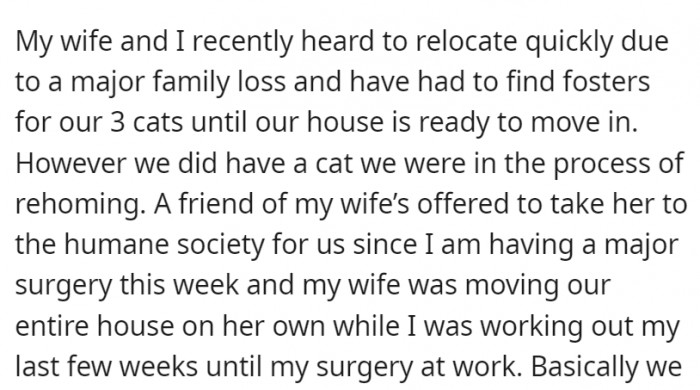
However, this friend completely broke the couple's trust
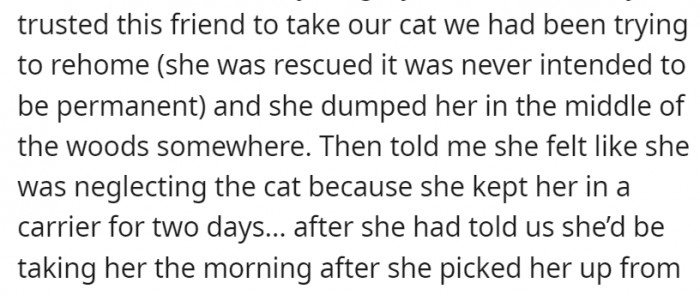
Understanding Emotional Responses
This situation highlights a classic case of emotional dysregulation, where individuals react impulsively under stress. According to Dr. Alexandra Solomon, a relationship therapist, "When our values, especially those concerning our loved ones, are threatened, it can lead to intense emotional responses." Research indicates that when people feel their values are violated, particularly regarding pets, their emotional responses can escalate rapidly. Here, the husband’s reaction may stem from a deep-seated concern for the animal's well-being and a feeling of betrayal from the wife's friend, which can trigger defensive behaviors, as noted by Dr. Michele Gelfand, a cultural psychologist who states, "Betrayal can provoke strong defensive reactions, especially when it involves someone we trust."
Understanding Emotional Responses
This situation highlights a classic instance of emotional dysregulation, where heightened feelings lead to impulsive reactions. According to Dr. John Gottman, a leading researcher in the field of relationship psychology, such outbursts can arise from accumulated stress and unresolved conflicts.
His research indicates that when people feel threatened or disrespected, their ability to respond rationally diminishes significantly, often resulting in harsh words and judgments.
Of course, the couple was upset and the husband couldn't help but saying some things to this friend
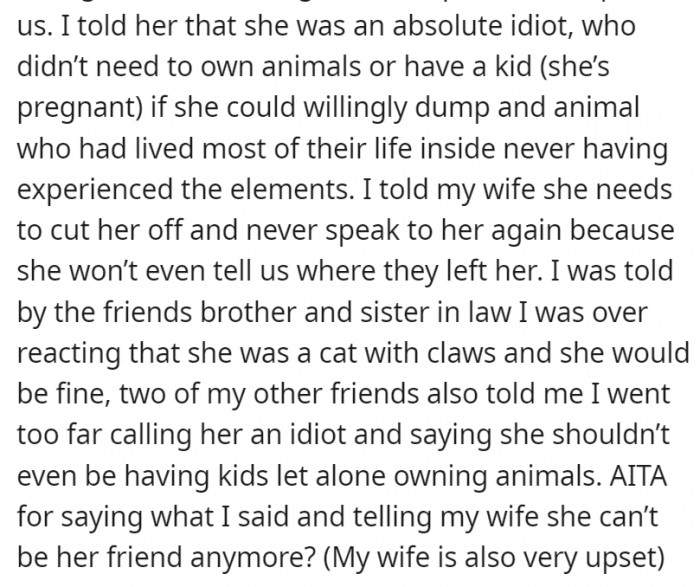
Even if the cat was going to another home at that point, the couple trusted this person to get the cat from their home to human society in one piece. They trusted her to do one job.
Her reasoning for letting the cat go also didn't make sense, especially the part where she held onto the cat for days when she was supposed to have delivered it already. Anyone would get mad over that.
Did the husband go overboard though? Many commenters on Reddit don't think so.
Here are the top comments.
1. She practically endangered that cat's life by setting it free out there

2. She probably didn't take into consideration that the couple cherished the cat
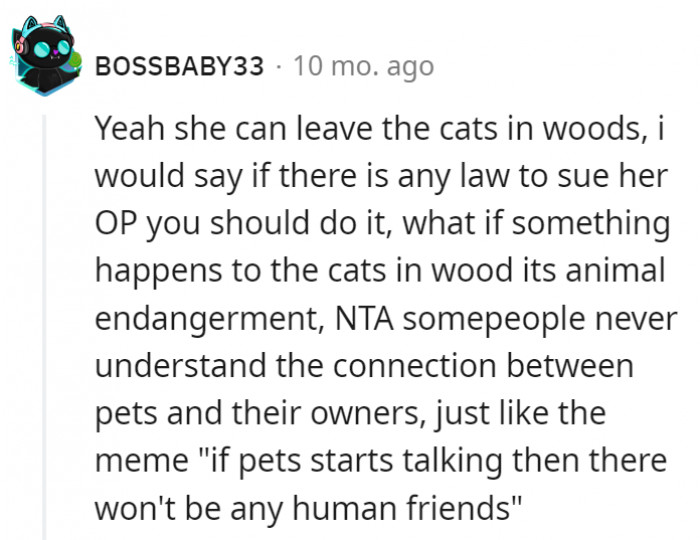
Behavioral psychologists emphasize that our attachments to pets can mirror those we have with people, underscoring the significance of these relationships.
When someone feels that an attachment is threatened, such as through the abandonment of a cat, it can provoke a visceral reaction.
This reaction is often less about the act itself and more about the underlying feelings of loss and helplessness related to perceived betrayal.
Moreover, this scenario exemplifies the role of attachment styles in adult relationships. Research by Dr. Phillip Shaver and Dr. Mario Mikulincer shows that individuals with insecure attachment styles may display heightened sensitivity to perceived slights, leading to disproportionate emotional reactions.
Understanding these underlying patterns can foster empathy and encourage healthier communication strategies between partners.
3. Leaving the cat in the carrier for two days was already the first straw but she just decided to make the situation worse by letting the cat free in a dangerous place for it

4. This is a very possible theory

5. Obviously, they know very little about domesticated house cats

The Importance of Communication
Experts suggest that effective communication is crucial in resolving conflicts like these.
In fact, research indicates that couples who engage in open dialogues about their feelings tend to have stronger relationships.
Encouraging the husband to express his feelings without resorting to name-calling can foster a more understanding environment, allowing for constructive discussions about boundaries and pet care responsibilities.
The Impact of Conflict on Relationships
Conflict is a natural part of relationships, but how it's managed can significantly affect the bond between partners. Dr. Susan Johnson, a pioneer in Emotionally Focused Therapy, emphasizes that recognizing and validating each other's feelings is crucial during disagreements.
Her studies demonstrate that couples who engage in constructive conflict resolution—where they express feelings without blame—tend to maintain stronger, more resilient relationships.
6. The least she could do is tell them where so they could try and find her
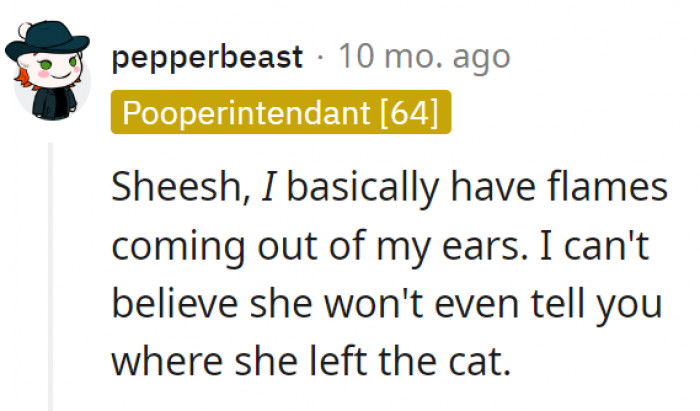
7. It's not something a friendship can easily recover from
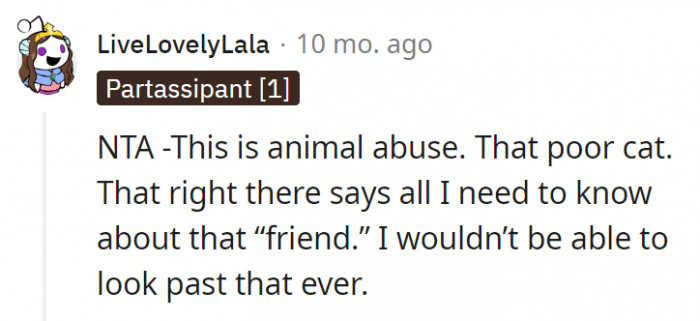
8. The way a person will turn out as a parent can be seen in the way they treat others even animals
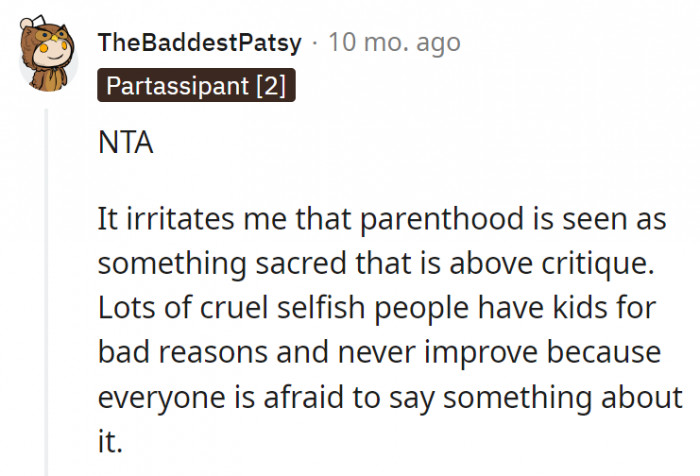
Additionally, support from friends and family can play a significant role in how people cope with emotional stress.
Psychological studies show that social support can buffer against emotional reactions, allowing individuals to process their feelings more calmly.
Encouraging this couple to seek external support or counseling may help them navigate their feelings surrounding pet ownership and interpersonal boundaries.
To mitigate such conflicts, couples are encouraged to adopt a strategy known as 'time-out'. This involves stepping away from the heated moment to cool off and reflect. Research indicates that this pause can enhance emotional regulation, allowing for more thoughtful responses once the discussion resumes.
Implementing techniques like active listening and expressing one's own feelings without attacking the partner can create a safer space for dialogue.
9. The cat shouldn't have even been in the carrier since she should have been delivered to the humane society
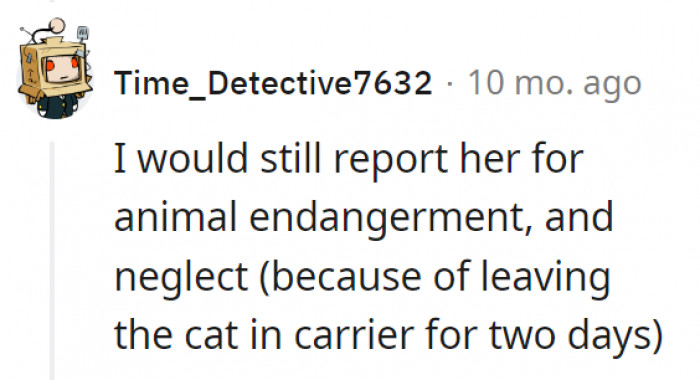
10. Let her learn a lesson
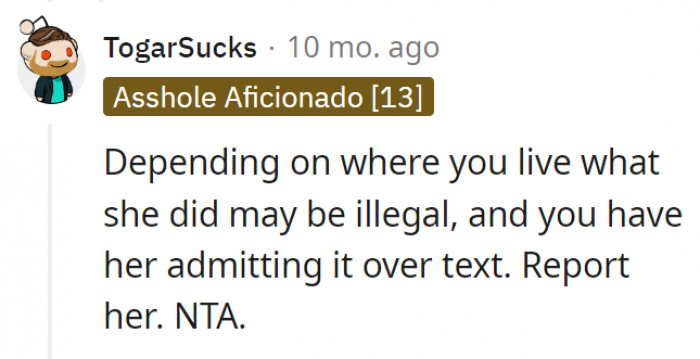
11. If she didn't want it taken that far, she should've thought of her actions before doing them
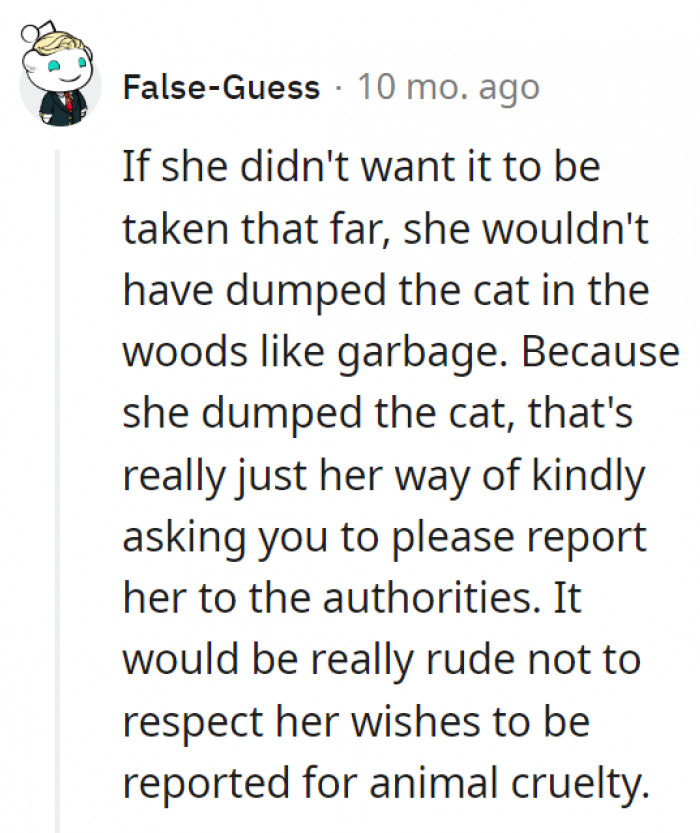
Potential Solutions for Better Outcomes
One practical approach would be implementing conflict resolution strategies.
These could involve discussing expectations around pet care openly and establishing clear guidelines on what to do if a pet is at risk.
Research suggests that couples who set shared goals are more effective in managing conflicts, as it fosters teamwork rather than opposition.
Reframing Negative Reactions
Often, reactions like name-calling stem from deeper frustrations and unmet needs within the relationship. Dr. Marshall Rosenberg’s Nonviolent Communication framework suggests focusing on expressing feelings and needs rather than resorting to judgment or blame.
This approach fosters a more compassionate dialogue, enabling partners to understand each other's perspectives and work collaboratively toward solutions.
12. Many people wouldn't just have called her an idiot

13. This woman would've gotten far worse with other cat lovers

It does sound suspicious
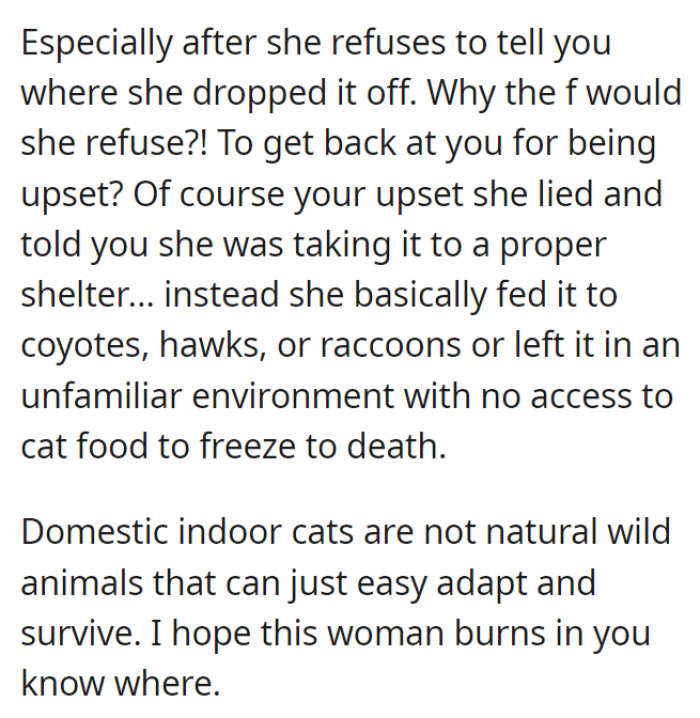
Moreover, understanding the psychological concept of projection can help clarify behaviors in this scenario.
When individuals project their feelings onto others, they may accuse someone else of being irresponsible to deflect from their discomfort.
Recognizing this pattern can encourage the husband to reflect on his feelings towards his wife’s friend and find healthier ways to express his anger.
In practical terms, couples can benefit from keeping a 'relationship journal' where they document conflicts and their feelings surrounding them. Research shows that reflective practices like journaling can improve emotional clarity and communication skills over time.
By identifying patterns in their conflicts, couples can work towards addressing the root causes rather than just the symptoms.
14. Gotta love her playing victim

15. She must have done something a lot worse so she's not telling the whole truth
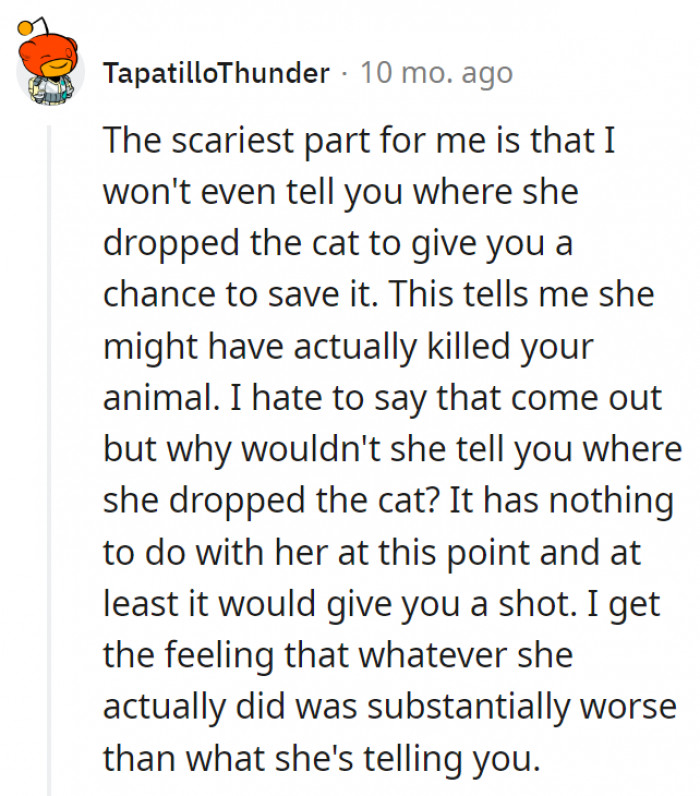
16. Domesticated cats don't have the instincts that their wild ancestors had
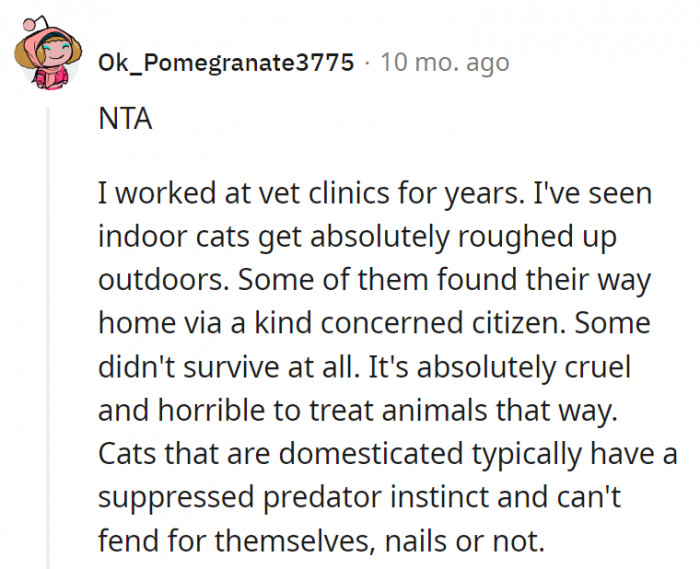
Encouraging Empathy in Relationships
Empathy plays a vital role in resolving interpersonal conflicts.
According to Dr. Alexandra Solomon, a relationship expert, "Empathy is the cornerstone of healthy relationships; it allows us to connect and understand each other's experiences." Encouraging both parties to share their perspectives on the situation could foster understanding and prevent future incidents, as emphasized by Dr. John Gottman, who states, "The ability to listen and validate each other's feelings is essential for conflict resolution."
The Role of Empathy in Conflict Resolution
Empathy plays a critical role in resolving conflicts effectively. According to Dr. Brené Brown, empathy involves understanding and sharing the feelings of another, which can significantly de-escalate heated disputes.
Her research highlights that when individuals feel heard and understood, their defensiveness diminishes, paving the way for constructive discussions and solutions.
Cats need care
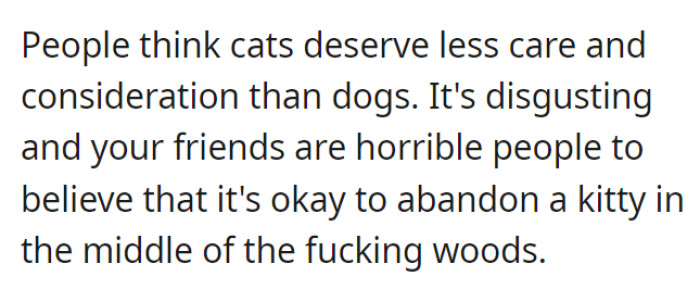
17. It's heartbreaking what she did to the cat

18. The cat owner was even kind given the situation

Ultimately, emotional intelligence is key in managing reactions like the husband’s.
Studies indicate that people with high emotional intelligence can navigate their feelings and the feelings of others more effectively, resulting in healthier relationships.
Engaging in workshops or reading about emotional regulation techniques can empower individuals to respond thoughtfully rather than reactively in tense situations.
Practicing empathy can be as simple as paraphrasing what your partner has said before responding. This not only shows that you are listening but also helps clarify any misunderstandings that may have arisen.
Moreover, couples can engage in exercises that encourage perspective-taking, such as discussing how they might feel if the roles were reversed in a particular situation.
19. Someone should knock some sense into that girl before she starts caring for a human child

20. She could have just taken the cat back or told them she couldn't take her instead of basically throwing her out there

What she did to that poor cat was just cruel. She just dumped her out there in the woods like a piece of garbage.
The cat wouldn't be able to fend for itself out there given its domesticated nature. Plus, it wouldn't be able to defend itself well against predators.
Hopefully, they still manage to find the cat and bring it back home. And hopefully, that "friend" learns a lesson from all this.
Long-term Solutions for Relationship Health
Ultimately, maintaining a healthy relationship requires ongoing effort and commitment from both partners. Dr. Ellyn Bader and Dr. Peter Pearson, co-founders of The Couples Institute, advocate for couples to engage in regular relationship check-ins.
These check-ins provide a structured opportunity to discuss feelings, address concerns, and celebrate successes, reinforcing the emotional connection between partners.
Psychological Analysis
This incident reflects common defensive mechanisms that arise in response to perceived threats within a relationship. When one partner feels disrespected, their immediate reaction often prioritizes self-protection over effective communication. Understanding these triggers can help couples address the underlying issues more constructively.
Analysis generated by AI
Analysis & Alternative Approaches
Understanding these psychological dynamics can transform how couples approach conflicts, leading to healthier, more resilient relationships.
As research consistently shows, effective communication and emotional awareness are foundational to lasting partnership success.
Reflecting on Personal Values
This incident also offers an opportunity for both the husband and his wife to reflect on their values regarding pet care.
According to psychological research, aligning personal values with actions can lead to greater satisfaction in relationships.
Encouraging them to discuss what pet ownership means to each of them can clarify their priorities and strengthen their partnership.
Analysis & Alternative Approaches
Research from the National Institute of Mental Health emphasizes that understanding emotional triggers is fundamental in resolving conflicts.
By fostering better communication and empathy, individuals can navigate their emotional responses and enhance their relationships.
Ultimately, it's about creating a safe space for dialogue that allows for healing and understanding.



